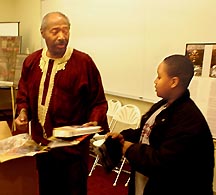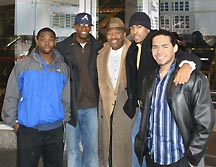“Men’s Voices of Optimism from the Africana†Conference
Primary tabs
As part of its Male Development and Empowerment Center initiative, Medgar Evers College in Brooklyn, NY held a conference entitled “Men’s Voices of Optimism from the Africana,†focusing on the problems of African American and Caribbean young men.

In late
December, as part of its Male Development and Empowerment Center (MDEC)
initiative, Medgar Evers College in Brooklyn, NY held a conference entitled
“Men’s Voices of Optimism from the Africana,†focusing on African American and
Caribbean males.
This educational
event was for students from kindergarten through college, and, as MDEC’s
Executive Director, Professor Gerald Jackson, explained, “We like to think of
it in terms of prevention. We're providing children with successful role models
– most specifically, college age Black men with integrity who have successfully
negotiated the educational system while maintaining a functional relationship
with their communities.â€
Jackson also stated
that part of what made the conference unique is that it was not a one-time
event, but, instead, marked the beginning of an ongoing process of engagement
of MDEC with the participants and their peers. This continuing program employs
what they call the Systemic Inclusion Approach, which, along with prevention,
aims at:
- Empowerment – through the process of youth
working cooperatively, intelligently, and expeditiously with a diversity
of men and women. - Leadership – through providing youth with
opportunities to witness others exercising leadership skills and also
through hands-on tasks that provide the youth with the chance to exercise
various types of leadership themselves. - Scholarship – based on Prof. Jackson’s most recent
book, We’re Not Going To Take It Anymore: Educational and Psychological
Practices from an Africentric Paradigm of Helping. Among the many
invaluable items included in this book are student essays on noted Black
and Caribbean activists/scholars as well as on figures who were paramount
in the success of Black and Latino college students. There are also
treatises on the practical value of Black and Latino Greek fraternities in
the elevation of their people and compositions telling of what students
gained in terms of education and identity awareness from attending African
American cultural events.
During the
morning, men read essays – several of which appear in the book – that they had
written for Prof. Jackson while he was a faculty member in the Africana Studies
and Research Center at Cornell University. Each essay was inspirational and
provided real role models of young Black men who came out of urban
environments. Some of the men, such as Nafis Smith who is now a bond trader
with the Vanguard Group, were from households with crack-addicted mothers. “I
thought it was really important for young people to find out that you can come
from humble origins and yet go on to be successful,†Jackson said.
Around midday, participants broke out into smaller sets
formed around their age group in order to look at the problems Black men face
and to come to solutions about what should be done to deal with these problems.
The individual groups then reported their findings to the entire assemblage.Â
Later in the
afternoon there was another small-group session, this time divided into groups
of students, parents, or teachers. Each group discussed “How can we use our
voices to promote healthy relationships for African American and Caribbean
males and to help them achieve their educational and psychological potential?â€
This, too, was followed by a report-back from each group.
One of the
highpoints of the conference was a session with the noted activist, poet, and
hip-hop historian, Kevin Powell. Not only was he one of the day’s speakers, but
he was one of the men that students had written essays on that are published in
the book. One such essay was titled, “Keepin’ it real enough for you,†by
Justin Davis. It was read by his colleague Andre Providence.Â
Throughout the
day, not only did the young participants get to see their older male role
models take part in panel discussions and conduct workshops, but there was
ample time to interact with them on a more personal level, one-to-one. This was
particularly evident at the end of the conference, which concluded with a book
signing and social time.
Since the
conference, attendees have begun writing essays about the conclusions their
groups arrived as to how to solve the problems of Black males. These essays
will be read by teachers and upper-class college students. “The idea of having
college students read and evaluate the essays,†noted Jackson, “is to encourage
them to think seriously in terms of what contribution they can make to their
community as they go along.â€Â
At a follow-up
conference in February, some of the essays will be read and awards will be
given out. Participants will also consider the next practical steps that can be
taken within their families, schools, and communities to address Black male
issues.
For further
information, contact Prof. Jackson at 718-270-6131 or gerald@mec.cuny.edu.










